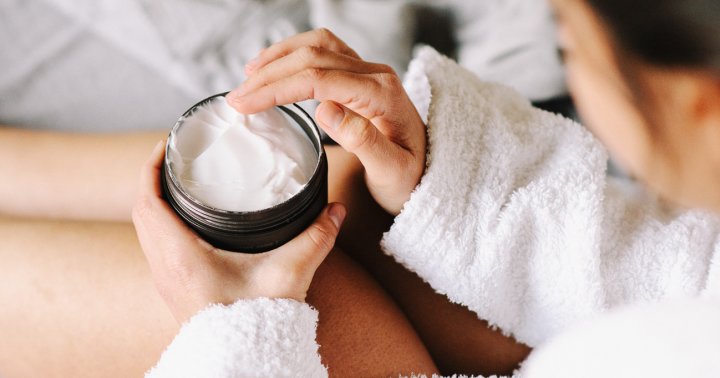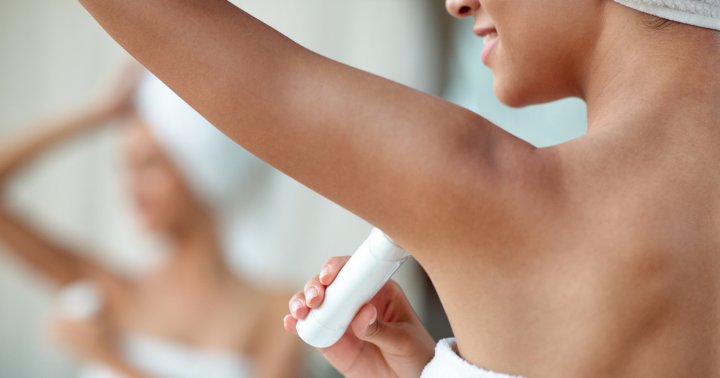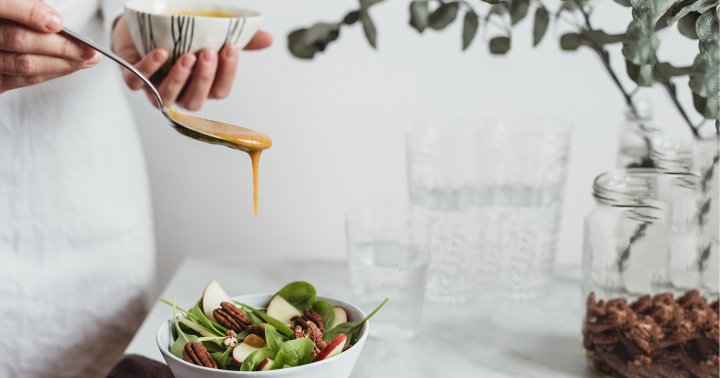Everyone 30+ Should Focus On These 3 Nutrients For Firmer, Brighter Skin
Once you hit your 30s, you're at the perfect age to start folding in more potent products.


Senior Beauty & Lifestyle Director
Senior Beauty & Lifestyle Director
Alexandra Engler is the senior beauty and lifestyle director at mindbodygreen and host of the beauty podcast Clean Beauty School. Previously, she's held beauty roles at Harper's Bazaar, Marie Claire, SELF, and Cosmopolitan; her byline has appeared in Esquire, Sports Illustrated, and Allure.com.
Image by Lyuba Burakova / Stocksy September 30, 2024 I know there's a huge trend of "anti-aging" products being used by younger and younger folks, but the truth is the skin doesn't start aging until the mid- to late 20s. So while it's always valuable to stick to a general skin care routine, utilizing an "anti-aging routine" is somewhat unnecessary. But once you hit your 30s, you're at the perfect age to start folding in more potent products. Around this time, collagen production starts to slow down, the skin barrier function weakens, and skin cells start to lose energy. This all results in many of the signs we associate with skin aging: fine lines, dark spots, sagging, dullness, and so on. One way to support your skin is to be mindful of your nutrient intake, as the body needs these precious nutrients to create healthy, firm skin. "You need to give your body the raw materials to regenerate," board-certified holistic nutritionist Jennifer Hanway once told me. And if you're lacking in any area, the skin may suffer as a result. We avoid using the term "anti-aging" here at mindbodygreen. Aging is a privilege—if you aren't aging, you aren't living! We only use it here because products that target common concerns for aging skin (dark spots, fine lines, sagging, etc.) often get compiled into one "anti-aging" category. We use it here so that you'll recognize which products we're talking about, but we by no means view any skin routine as "anti-" aging.
Editor's note
Amino acids
Collagen and elastin are the structural proteins that help create the scaffolding of the skin. Essentially, they keep skin looking firm, smooth, supple, and youthful. Unfortunately, at some point during the late 20s, the amount of collagen produced by the body slows, while the rate of depletion quickens. This results in a rate of loss of about 1-2% per year1. Yikes.
It's also very important to focus on amino acid intake. Amino acids are the building blocks of proteins, and we get them by consuming protein. "Now, our body unfortunately doesn't prioritize the skin as an essential organ—unlike our brain, hearts, or lungs. So, if we're only eating minimal or even adequate protein, the body won't be able to give those extra amino acids to our skin, hair, or nails to keep them looking healthy," Hanway told me.
The recommended dietary allowance (RDA) of protein is 0.8 gram per kilogram of body weight2 per day. This is the minimum amount of protein a sedentary person needs to meet their nutritional requirements and keep things going, so it's conservative.
For the added benefits, Hanway explains we need to be eating closer to 1.0 to 2.0 grams of protein per kilogram of body weight. Most of the experts we regularly work with suggest aiming for a goal of around 100 grams of protein per day. "For most women, 100 to 120 grams is a really good starting point," Hanway says.
mbg POV:
For help supplementing, lots of folks turn to powders, like collagen. Collagen is a protein made of peptides, but it's not a complete protein—it doesn't have all nine of the essential amino acids (it's missing tryptophan and is on the lower side on a few others)—but can certainly still contribute to your overall protein goals on a daily basis. For a collagen supplement, we recommend looking in the 10- to 20-gram range, which will get you skin and full-body benefits. Check out our favorite collagen supplements here.
Healthy fats (omega 3s)
With time, the skin barrier weakens due to internal and external factors. Externally, the skin is bombarded with a variety of stressors, such as pollution and UV exposure. Internally, inflammation, stress, and lack of nutrients can contribute to damage as well.
Holistic plastic surgeon Anthony Youn, M.D.: "[Eating] nutrient-dense foods is a big thing you can do to help to slow down the aging process," he shares on the mindbodygreen podcast, noting that one he emphasizes for skin health is omega-3s.
Why omega-3s specifically? "Good, healthy fats are anti-inflammatory," Youn says. Studies back him up, establishing that omega-3 fatty acids possess potent antioxidant and anti-inflammatory properties3, helping the body to combat damaging free radicals and oxidative stress.
For the skin barrier specifically, omega-3s can also help support your skin's natural lipid layer. One study5 found that participants who combined omega-3 supplements with topicals had improved overall skin health and appearance compared to those who only used topicals.
Coenzyme Q10
The body needs antioxidants to deal with free radicals, the damaging molecules that wreak havoc on the skin and body. To deal with the regular onslaught of environmental aggressors, the body actually makes its own antioxidants, including coenzyme Q10 (CoQ10).
CoQ10 is a fat-soluble compound that's found in all your cells and helps the cells produce energy6. It works in the mitochondria (the "powerhouse of the cells"), transporting electrons that help produce energy.
This energy is used to do a variety of functions throughout the body, including producing the components of skin such as collagen and elastin.
In its role as an antioxidant, it also protects fibroblasts (what makes collagen and elastic fibers), research shows7. Perhaps because of this protective effect, CoQ10 supplementation8 has been clinically shown to improve skin elasticity and smoothness while reducing wrinkles and fine lines.
The takeaway
When you hit 30, you're at the perfect spot to start getting serious about skin care, as that's when skin changes typically start to occur. Not only should you focus on external skin care, but prioritize eating a robust, healthy, balanced diet to feed your body the nutrients it needs to remain firm and youthful.

 KickT
KickT 


































